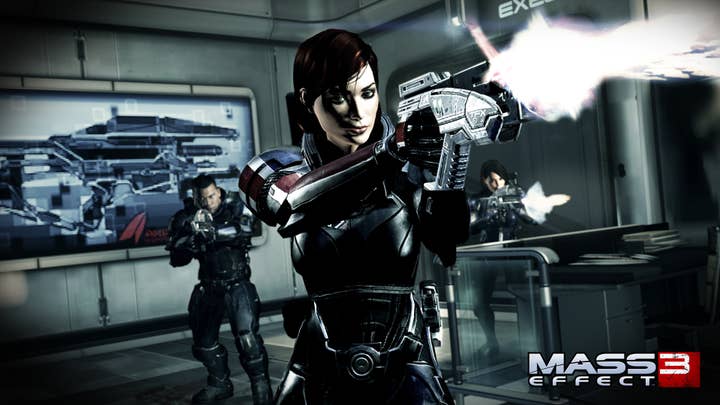Mass Effect 3 Ending: Legal Experts Weigh In On "Deceptive Advertising"
Better Business Bureau claims blown out of proportion say attorneys
No matter how good a particular video game might be, some gamers will always find something to complain or have misgivings about; it's been a reality of the business practically since video games have been in existence. However, since the average gamer is now older and more aware of his/her rights as a consumer, repercussions can end up being much greater than just angry remarks on a message board.
Take, for example, the recent comments put forth by the Better Business Bureau (BBB) in the US, which fueled by angry consumers, recently downgraded Capcom from an "A+" to a "B" rating. This stemmed from several complaints relating to Street Fighter X Tekken's on-disc DLC. More prominently, the BBB has raised the possibility that Electronic Arts and BioWare misled consumers with the advertising for Mass Effect 3.
"Consider this: If you had purchased a game for $59.99... and were told that you had complete control over the game's outcome by the choices your character made and then actually had no control over the game's outcome, wouldn't you be disappointed? The issue at stake here is, did BioWare falsely advertise? Technically, yes, they did," said Marjorie Stephens, Director of Communications at BBB of Northern Indiana.
Given how lawsuit happy so many Americans tend to be, we posited a question to a few legal experts: is there actually any legal ground for consumers in a class-action lawsuit or are players and the BBB just blowing this whole scenario out of proportion? The response was almost universally towards the latter.
"In many situations, our litigious nature is just a waste of everybody's time"
Patrick Sweeney
"I would tend to fall on the 'blowing things out of proportion' side of the line," said Mark Methenitis, Author and Editor-in-Chief at Law of the Game. "While there may be enough for a false advertising kind of suit here, even a class action one, neither case seems that egregious to me. For the Capcom one, unless Capcom had advertised those characters as being free, it's almost a non-issue entirely. All they're really doing is saving some bandwidth for the DLC."
"Mass Effect is a better case, since the outcome wasn't dictated by choice to the effect suggested in interviews, but interviews aren't generally treated as true ads. Moreover, this is the first case I can think of where 'I don't like the ending' has led to this kind of uproar. How many other games and movies have had bad endings without this kind of backlash? I could name dozens."
"The claim is based on deceptive business practices, where the vendor lies to the consumer and gives a different product than promised," noted analyst and lawyer Michael Pachter, Managing Director of Equity Research for Wedbush Securities. "That means dog meat instead of beef, not rare instead of medium rare. I agree that 'only' 3 endings didn't give gamers what some expected (unlimited permutations based on player choice), and agree that it was disappointing to have so few choices at the end, but the 'damage' here is at most a refund for those who were dissatisfied, not any massive government action against EA/BioWare."
"I am not sure that I even accept the premise of the complaint: as far as I know, the company said player choices would influence the outcome, but I don't think there was a guarantee of limitless outcomes. Rather, the player was offered a choice of three ending paths," Pachter continued. "Arguably, this could be construed to mean player choice affected the outcome. I suppose there may have been a comment from someone at BioWare that 'every' choice would affect the outcome, but it would be difficult to prove that furnished the sole basis for the purchase. Curiously, NO reviewer that I am aware of pointed out the lack of ending choices. That means this is just one more thing blown out of proportion by the gaming press."
To Patrick Sweeney, head of Reed Smith's Video Game Practice and a member of the Video Game Bar Association's board, it's less about legalities and more about customer service.

"It's primarily an advertising and marketing issue," said Sweeney. "Game companies just need to be careful in what they're saying, just like with any product. Those parameters are pretty well established - if something isn't there as was advertised, the company will have to answer for it. If it's as simple as a decision at the end of the game and people are unhappy, that's really more of a customer service issue. But it depends on the particulars of what was actually said and what the final product actually is."
After we mentioned that gamers are older on average now and are more legally savvy (evidenced by a recent class action lawsuit against GameStop that settled for the plaintiff) Sweeney said, "Leaving aside my legal opinion and purely on a personal level, if you're unhappy with a game you purchased, is a class action lawsuit the way to go? Can't you contact customer service, ask for a refund or try to trade it and sell it?"
"In many situations, our litigious nature is just a waste of everybody's time. There are activities that are egregious and that may require a legal course of action, but in some cases, it's just an opportunity for some consumers to be be heard."
Shawn Foust, Vice President of Business Development & General Counsel at PlayMesh, generally concurred with this sentiment, saying, "People are upset, I can empathize. But let's be honest: each of the Mass Effects incorporated a number of interesting forks in the road based upon player decisions. A lawsuit seems like a tremendous waste of time and resources. Believe me, I know. I'm a lawyer."
On the plus side, the fact that so many gamers are getting up in arms about the ending at least shows a maturation of the video games medium, Arkadium's Matt Plotecher argued in a recent editorial.

